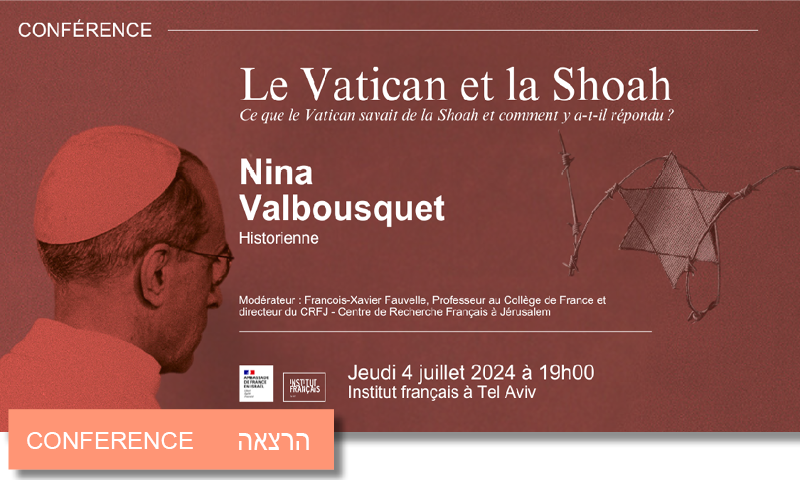Under the auspices of: Centre national de la recherche scientifique (CNRS), the Centre de Recherche Français à Jérusalem (CRFJ) and the Israel Antiquities Authority (IAA).
With the participation of : the Laboratoire Archéométrie et Prévention de l’Altération (LAPA-NIMBE-IRAMAT – Université Paris-Saclay).
With the support of : the Graduate School of Humanities – Heritage Science Paris-Saclay.
Organization/contacts:
Dr. Sylvain Bauvais, (CNRS, CRFJ) – sylvain.bauvais@cea.fr
Dr. Robert Kool (IAA) – robert@israntique.org.il
Participants:
Open to professionals, scholars and students of Paleometallurgy/Conservation sciences.
Location:
Day 1 : Israel Antiquities Authority National Campus of Archaeology (IAA), Rupin St 11, Jerusalem.
Day 2 : French Research Center in Jerusalem (CRFJ), Shimshon St 3, Baaka, Jerusalem.
Language:
All lectures are in English
Scientific Theme:
Excavation poses a dilemma of destruction versus preservation. While it is crucial to bear in mind that excavation can be detrimental to archaeological sites, the primary goal of archaeology is the safeguarding of cultural heritage and its inherent data. This is especially relevant today, as over 90% of archaeological data in countries like France and Israel is derived from preventive archaeology.
Archaeometric studies on metal artifacts from archaeological sites, encompassing technology, provenance, and dating, often necessitate intrusive or even destructive techniques. This is attributed to the heterogeneous nature of these materials and the limitations of non-invasive methods. Thus, they share similarities with the excavation process itself. Conversely, ensuring the long-term preservation of metals requires a comprehensive understanding of the materials involved and the processes of alteration. This knowledge is crucial for making informed decisions regarding conservation and restoration.
Preserving the physical integrity of objects frequently presents a significant challenge to the advancement of paleometallurgical studies, particularly when the objects become part of museum or state collections, as is the case in France and Israel. The intricate relationship between archaeometric analysis and object conservation is particularly pertinent for iron and other metals prone to significant corrosion over time, both within and outside of their conservation environment. Once an object is unearthed, a real countdown begins, with the risk of complete destruction if no preventive interventions are applied. Implementing preventive measures is costly, involving methods, storage, and other resources, and it is not feasible to apply them to every discovered object, especially in countries where preventive archaeology yields a vast quantity of material. A contradiction arises between removing an object intrusively or destructively, and leaving it untouched. The former allows for the extraction of a maximum amount of archaeological information before it vanishes, while the latter preserves the object’s integrity but risks deterioration and the loss of its valuable information. This dilemma is particularly prominent in Israel, where, similar to France, preventive archaeology is highly developed, and archaeological objects possess significant national heritage value.
In France, paleometallurgical studies have become possible through ongoing collaboration between archaeologists, archaeometry specialists, and conservators. This collaboration has successfully integrated archaeometry as a crucial component in the field of conservation. Notably, such interdisciplinary approaches are implemented within the University of Paris-Saclay and its Graduate School “Histoire et Science du Patrimoine” (HSP), in conjunction with research laboratories like the CNRS Laboratoire Archéométrie et Prévention de l’Altération (LAPA-NIMBE-IRAMAT) located in the French Commissariat for Atomic Energy (CEA-Saclay).
To foster knowledge exchange and shared experiences, this workshop will facilitate a dialogue between Israeli and French archaeometry specialists, archaeologists, restorers, and conservators. Two French researchers, who specialize in paleo-metallurgy and new techniques of metal preservation, will contribute to the discussions. The primary objective of the workshop is to encourage reflection on individual practices and explore how these practices can be adapted and mutually enhance the work of participants.
Organization:
This Workshop will be organized in partnership between LAPA-IRAMAT/NIMBE, Paris-Saclay University, the French Research Center in Jerusalem (CRFJ) and the Israel Antiquities Authority (IAA) on October 23 and 24, 2023. It will be followed by 2 days of practical exchanges within paleo-metallurgical study laboratories and Israeli metal conservation centers.
The Workshop will be hosted by the CRFJ, which will be responsible for welcoming the participants and the IAA, which will host the first day in the auditorium of its new building in Jerusalem. The communications will be accessible by videoconference for students, French and Israeli.
Eight 20-minute presentations will be offered on the second day. We invite you to submit your abstracts as soon as possible (deadline July 31st) so that we can organize this second day of communication.
Program proposal
Day 1: 23/10/2023 – IAA Building, Jerusalem
9:00: Arrival/welcome of participants, coffee
9:45: Welcome speeches: Dr. Yuval Baruch, Head, IAA Archaeological Division
10:00-11:00: Philippe Dillmann: ‘Determining the corrosion processes on archaeological iron: from analogue studies to conservation issues’.
11:00-11:30: Break
11:30-12:30: Delphine Neff: ‘New approaches to the conservation and stabilization of metallic objects’.
12:30-13:00: Discussion
13:00-14:30: Lunch
14:30-15:00: Adi Eliyahu-Behar and Naama Yahalom-Mack: ‘Preservation of Iron in Archaeological Sites of the Southern Levant: A View from the 1st Millennium BCE’.
15:00-15:30: Erez Ben-Yosef: ‘Analyzing copper-based alloys: opting for destructive’.
15:30-16:00: Sylvain Bauvais: ‘Setting up research into iron paleo-metallurgy in France and Israel’.
16:00-17:00: Discussion
Lunch for organizers and guests
Day 2: 24/10/2023 – CRFJ, Jerusalem
9:00: Arrival/welcome of participants, coffee
9:45 am: Welcome speech by the Director of the CRFJ
10:00-10:30: 20 minutes talk and 10 minutes questions
10:30-11:00: 20 minutes talk and 10 minutes questions
11:00-11:30: Break
11:30-12:00: 20 minutes talk and 10 minutes questions
12:00-12:30: 20 minutes talk and 10 minutes questions
12:30-14:00: Lunch
14:00-14:30: 20 minutes talk and 10 minutes questions
14:30-15:00: 20 minutes talk and 10 minutes questions
15:00-15:30: Break
15:30-16:00: 20 minutes talk and 10 minutes questions
16:00-16:30: 20 minutes talk and 10 minutes questions











